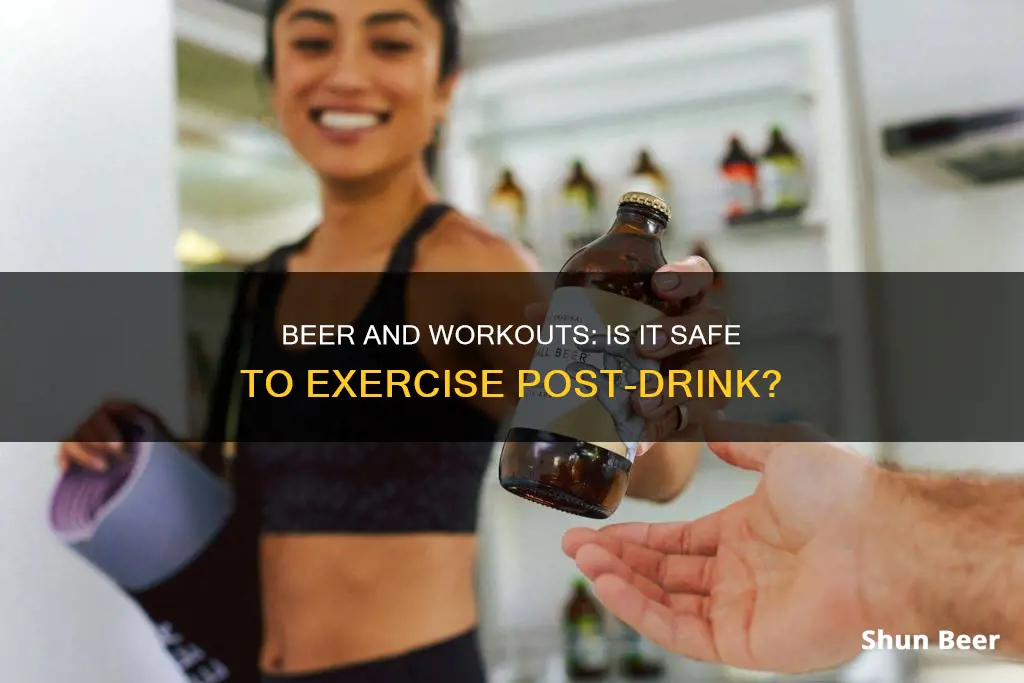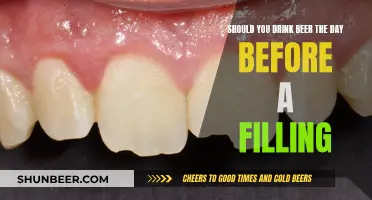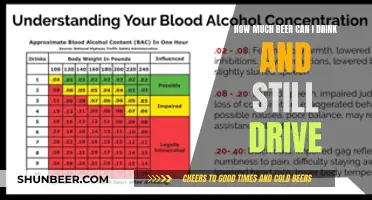
Alcohol and exercise are two activities that don't go well together. Whether you're planning to hit the gym after happy hour or the morning after a night of drinking, it's important to know how alcohol can affect your body and performance. Here's what you need to consider before deciding to work out after drinking a beer.
What You'll Learn
- Alcohol negatively impacts reflexes, balance, and coordination
- Dehydration caused by alcohol can lead to dizziness and muscle cramps
- Alcohol impairs the body's ability to produce energy
- Drinking alcohol can slow down the recovery process after an injury
- Alcohol can disrupt sleep patterns, leading to slow muscle gain

Alcohol negatively impacts reflexes, balance, and coordination
Alcohol also has a direct effect on the cerebellum, the part of your brain responsible for motor control, timing, and balance. It impairs your body's ability to coordinate its many systems effectively. This is why, after a few drinks, standing up straight becomes a challenge. The cerebellum also plays a role in cognitive functions such as spatial and other sensory perceptions, problem-solving, organization, and planning. Alcohol-related cerebellar damage can lead to residual, subtle, and persistent deficits in balance that may increase the risk of accidents, such as falling.
The inner ear also plays a crucial role in maintaining balance. It contains a delicate structure called the vestibular system, which is responsible for maintaining our body's sense of balance by detecting changes in motion or position. When you consume alcohol, it diffuses into your bloodstream and affects this system, altering the viscosity of the fluid within the semicircular canals. This change confuses your brain about where you are in space, leading to dizziness and a loss of balance.
In addition, alcohol interferes with the production of the antidiuretic hormone, arginine vasopressin, leading to dehydration. Dehydration can further worsen coordination and balance as it affects your body's ability to maintain the flow of blood through your body, which is essential for carrying oxygen and nutrients to your muscles.
Mixing Beer and Wine: Safe or Not?
You may want to see also

Dehydration caused by alcohol can lead to dizziness and muscle cramps
Dehydration is a condition in which your body loses more fluids than it takes in, and it can be dangerous if left untreated. It can occur when you lose more fluids than you consume, such as through sweating, vomiting, or diarrhoea. Alcohol is a diuretic, which means it increases urine production and can lead to dehydration. When you're dehydrated, your body's natural response is thirst, and you may experience symptoms such as a dry mouth, headache, fatigue, and dizziness.
Drinking alcohol can contribute to dehydration because it interferes with the production of the antidiuretic hormone, arginine vasopressin. This hormone helps regulate water balance in the body. When you drink alcohol, your kidneys become focused on filtering it out, which can lead to dehydration. Exercising soon after drinking alcohol can worsen dehydration because you also lose fluids through sweating during exercise.
Dehydration can lead to reduced exercise performance and increase the risk of dizziness, fainting, and muscle cramps. This is because dehydration impairs the delivery of oxygen and nutrients to your muscles, affecting their ability to function properly. Dehydration also reduces blood flow to the muscles, making them more susceptible to cramping.
To prevent dehydration, it's important to drink fluids before you get thirsty. Water is the best option to stay hydrated, but you can also include electrolyte drinks or balanced nutrition to ensure adequate electrolyte intake. Staying well-hydrated is crucial to maintaining optimal muscle function and overall health.
Drinking Beer With Amoxicillin: What You Need to Know
You may want to see also

Alcohol impairs the body's ability to produce energy
Alcohol is a diuretic, which means it makes your kidneys produce more urine. This can lead to dehydration, which in turn can cause dizziness, fainting, and muscle cramps. Dehydration also reduces exercise performance as the body needs to be well hydrated to maintain the flow of blood, which is essential for carrying oxygen and nutrients to the muscles.
Alcohol also impairs the body's ability to produce energy. When alcohol is in the body, the liver focuses on breaking it down, and all other functions become secondary. One of the liver's functions is glucose production, which is necessary for energy. If the liver is busy breaking down alcohol, it won't be producing enough glucose, leading to a lack of energy.
Additionally, alcohol slows down the nerves that pass messages around the body, causing a relaxed feeling. This can result in slower reactions, coordination, accuracy, and balance during exercise. Alcohol also disrupts the water balance in muscle cells, altering their ability to produce adenosine triphosphate (ATP), which is the primary source of energy for muscles.
The high number of calories in alcohol, around 100-150 per drink, are not converted to glycogen and are therefore not a good source of energy during exercise. Alcohol calories are treated as fat by the body, and alcohol use inhibits the absorption of important nutrients such as vitamins and minerals.
Non-Alcoholic Beer: A Safe Choice or a Relapse Risk?
You may want to see also

Drinking alcohol can slow down the recovery process after an injury
Drinking alcohol can negatively impact your workout performance. Even a single drink can affect your brain and muscle function, leading to a higher risk of injury. Alcohol is a diuretic, which means it increases urine production and can lead to dehydration. Dehydration can cause dizziness, fainting, and muscle cramps, which can be dangerous during exercise. Alcohol also impairs your reflexes, balance, and hand-eye coordination, further increasing the risk of injury.
Additionally, drinking alcohol can slow down the recovery process after an injury. Here are several reasons why:
- Increased Blood Coagulation and Swelling: Alcohol consumption can delay blood coagulation and the healing of inflamed or swollen tissues. The more alcohol is consumed, the more problematic coagulation and swelling become, prolonging the recovery process.
- Build-up of Lactic Acid: Alcohol can cause a build-up of lactic acid in the muscles, leading to fatigue and cramps, which delay recovery.
- Diuretic Effect: Alcohol has a diuretic effect, causing increased urination and dehydration. Dehydration is detrimental to the recovery process as it leads to muscle weakness, cramps, and fatigue.
- Impaired Muscle Recovery: Alcohol reduces the secretion of human growth hormones (HGH) by up to 70%, hindering muscle growth and recovery.
- Interference with Healing: Alcohol can impair immune function and the body's ability to repair damaged tissues, slowing down the healing process and potentially leading to complications.
- Nutritional Depletion: Alcohol depletes essential nutrients, vitamins, and minerals required for tissue repair and overall health.
- Sleep Disturbance: Alcohol negatively affects sleep patterns, and quality sleep is crucial for tissue repair, hormone regulation, and overall well-being during the recovery process.
It is important to note that while light beer or non-alcoholic beer may have some potential benefits for rehydration after a workout, alcohol consumption during the recovery process from an injury is generally not recommended.
Beer and Kidney Infections: Is There a Link?
You may want to see also

Alcohol can disrupt sleep patterns, leading to slow muscle gain
Alcohol can negatively impact your sleep quality, which can lead to slow muscle gain. While a drink or two may help you fall asleep, it can cause frequent wakings and low-quality sleep throughout the night. This is because alcohol disrupts your sleep cycle, causing you to spend less time in the important REM stage of sleep. As a result, you wake up feeling less refreshed and may experience a rise in N1 sleep, the lightest stage of sleep.
Additionally, alcohol can lead to chronic sleep problems and disorders like sleep apnea, a condition that narrows your airways and can stop you from breathing properly at night. Sleep apnea can further contribute to health issues such as high blood pressure, heart disease, and diabetes.
The negative impact of alcohol on sleep can also be due to the dehydration it causes. As a diuretic, alcohol increases fluid loss through urine and sweat, making dehydration worse, especially when combined with exercise-induced sweating.
Furthermore, alcohol can interfere with the release of growth hormones during deep sleep, which are necessary for muscle growth. This disruption can lead to slower muscle gain, hindering your fitness goals.
Therefore, it is advisable to avoid alcohol, especially before exercise, to ensure optimal sleep quality and support muscle growth and recovery.
Alcohol and Breastfeeding: Is Drinking Wine or Beer Safe?
You may want to see also
Frequently asked questions
It is not recommended to work out after drinking beer. Alcohol is a nervous system depressant that slows down reflexes, impairs balance and hand-eye coordination, and can increase the risk of dehydration.
Drinking beer before a workout can negatively impact your performance by reducing your reaction time, coordination, accuracy, and balance. It can also interfere with glucose production, leading to decreased energy levels during exercise.
It is generally advised to avoid working out both before and after consuming alcohol. Drinking beer before a workout can impair your performance and increase the risk of injury. Working out after drinking can lead to dehydration and negatively impact muscle recovery.
It is recommended to wait for at least one hour per drink before working out. For example, if you've had two drinks, it's best to wait for at least two hours before starting your workout.
Some studies suggest that drinking a low-ABV beer (less than 4% alcohol content) after endurance sports can have similar rehydration properties to water. However, drinking more than one or two beers can lead to higher water loss, reduced muscle gains, and other negative effects.







